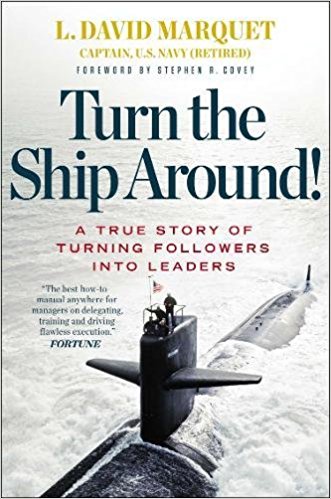 A True Story of Turning Followers into Leaders
A True Story of Turning Followers into Leaders
Wouldn’t it be great if everybody in the world has equal chances and opportunities? And wouldn’t it be even better if there are no rigid hierarchies, so that you can be both a leader and a follower, depending on the situation?
Of course, it would. Except it isn’t.
In fact, the totally opposite is true. Some are usually expected to follow, and the ones who lead are almost always ruthless in their leadership.
We’ve already learned a thing or two about leadership from some the past greats, such as Lincoln and Washington. And we went over the 21 laws of leadership.
But, “Turn the Ship Around” is a bit different. It’s even more democratic than “The Leaders We Need.”
Quick – find out how!
Who Should Read “Turn the Ship Around”? And Why?
Most of the books you’ve so far read about leadership are written by leaders and about everybody. Their main goal is to teach you, a regular guy, how to become a leader not too dissimilar from the respective writer.
“Turn the Ship Around” doesn’t conform to this standard. It is a book with a much narrower audience, written by a leader for leaders. And it’s got a lot to do with military skills. Its outlook, however, is groundbreaking even in that area.
In short, a revolutionary book about leaders who want to disrupt the leader-follower paradigm by learning about the benefits from an unconventional source: The US Navy.
About L. David Marquet
 David Marquet is a former U. S. Navy captain and a successful author on articles and books about leaders and leadership. A 1981 U.S. Naval Academy graduate, he commandeered the nuclear-powered USS Santa Fe submarine from 1999 to 2001, turning its crew from “worst to best” by disturbing the standard practices.
David Marquet is a former U. S. Navy captain and a successful author on articles and books about leaders and leadership. A 1981 U.S. Naval Academy graduate, he commandeered the nuclear-powered USS Santa Fe submarine from 1999 to 2001, turning its crew from “worst to best” by disturbing the standard practices.
He is a contributor to “Forbes”, and publishes the weekly YouTube motivational, “Leadership nudges”. You can reach him at his website: http://www.davidmarquet.com/.
Turn the Ship Around Summary
We’ve all been there:
You would give everything to not have to go to work tomorrow!
You know how we know this:
Because at least 1 in 2 Americans doesn’t like his or her job! No wonder that productivity plummets and unemployment levels rise to unprecedented levels!
According to Marquet, there’s a simple reason for this: we’ve lost our step with the times. And this is especially true for leaders and managers!
You see, today’s leaders are not much different than the ones who managed the building of the pyramids or the Industrial Revolution. In fact, a pharaoh might do just as good as a company CEO today. The problem is that this good is not good enough.
What do we mean?
Well, people like to follow. But, people follow other people only to a certain extent. When decision-making is a part of your job description, you are less likely to be efficient if you are led. You need to be the leader yourself.
That’s why “Turn the Ship Around” suggests that you think outside the box! Instead of a “leader-follower” approach, develop a “leader-leader” strategy. In short, train trailblazers – not devotees.
Because, if there’s one thing people like more than following is being followed. Everyone can be a leader, in its own fashion.
The author found out this himself while being a captain of the USS Santa Fe. While he was the commander, the submarine was awarded the most improved ship in the fleet, and the crew went from being the worst to one of the best around.
What is the best leader-leader approach?
It starts with an uncomfortable thing: giving away some of your power. And there are two important ways in which you can do this: giving your employees greater responsibilities and allowing them to make decisions on their own.
That made the members of the USS Santa Fe crew much more motivated and trustworthy. They didn’t ask for permissions. But they didn’t shy away from taking the blame either. They felt both freer and more accountable.
For how many of your workers can you say that?
Now, delegating is not a magical stick. It wouldn’t result in one of your untrained employees suddenly becoming better at what they’re doing! So, be careful with it.
In Marquet’s opinion, one thing that may help you is creating a tradition and a shared goal. That’s why Disney is so great, in fact. And that’s why Apple shares the “think differently” motto many times a year with its employees.
There’s no better way to inspire your subordinates than making them an equal part of the same decades-long story. That way, they will feel as part of a family.
And you will lead – by being led.
Key Lessons from “Turn the Ship Around”
1. The Leader-Follower Philosophy Is a Thing of the Past
2. The Times They Are A-Changing
3. The Leader-Leader Philosophy Is the Future
2. The Times They Are A-Changing
3. The Leader-Leader Philosophy Is the Future
The Leader-Follower Philosophy Is a Thing of the Past
Pharaohs did it. Factories in 19th century England did it as well. Why shouldn’t you?
The reason why the “leader-follower” philosophy worked for them was very simple: the workers were physical laborers, and they didn’t have to make any decisions for themselves. Leaders gave orders and the orders had to be resolute and unambiguous. Workers had to listen and never question them.
Leaders knew so much and the workers so little. Leaders wanted to be missed after leaving the premises.
It was all but slavery, but it was also efficient. You can move a stone or operate a steam engine only by using brute force. There’s no other way.
The Times They Are A-Changing
Nowadays, there is!
Most of the companies today are filled with smart and confident people who can add value to the company if given more freedom and responsibilities.
The 20th century was the century of workers. The 21st is the century of leaders.
The Leader-Leader Philosophy Is the Future
In a “leader-leader” philosophy you don’t take control in your hands – you give it to your workers. You do this by giving them more responsibilities, and less orders. You want your workers to know as much as you. Consequently, you want them to not miss you when you’re gone.
Above all, you want them to think for themselves and make decisions for themselves. To be leaders. Each and every one of them.
Like this summary? We’d Like to invite you to download our free 12 min app, for more amazing summaries and audiobooks.
“Turn the Ship Around” Quotes
My definition of leadership is this: Leadership is communicating to people their worth and potential so clearly that they are inspired to see it in themselves.In a leader-follower structure, the performance of the organization is closely linked to the ability of the leader.The leader-leader model not only achieves great improvements in effectiveness and morale but also makes the organization stronger.Leader-leader structures are significantly more resilient, and they do not rely on the designated leader always being right.Leader-leader structures spawn additional leaders throughout the organization naturally. It can’t be stopped.Our Critical Review
“Turn the Ship Around” is an unconventional book about leadership in any possible way.
First of all, it’s not written by a businessman, but by a US Navy Captain and deals with his experiences while commandeering a submarine. Secondly, it suggests turning your business strategy upside down – creating leaders instead of followers, developing the talent of those around you instead of using it.
Finally, it wasn’t received the way you would expect it to be! It had raving reviews, ranked as the second-best book on leadership by “USA Today” and described as “the best how-to manual anywhere for managers” by “Fortune”.
GetNugget couldn’t agree more. The principles the book teaches are both timeless and inspiring, encouraging and groundbreaking. We join the accolades. Gladly.

0 comments:
Post a Comment
Note: only a member of this blog may post a comment.